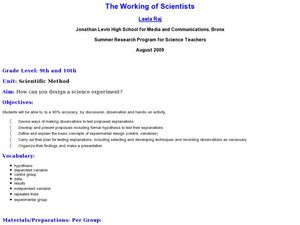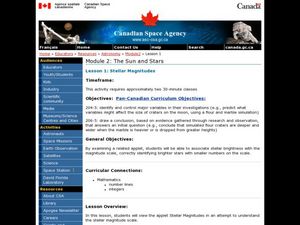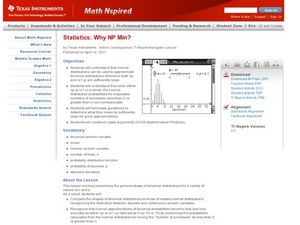Curated OER
Experiences and Experiments - There is a Difference
Sixth graders plan and conduct an experiment on food spoilage. They design the experiment, create a display, record and analyze data, and make inferences regarding the results of the experiment.
Curated OER
Survival
Students determine the best material from which to make a jacket to keep the body warm in a cold, dry, windy climate. This task assesses the student's abilities to perform an entire investigation.
Curated OER
What Can We Lose? What Do We Lose as we Gain Force With A Lever?
Third graders view a demonstration of a teeter totter as a basis for assessing pre-knowledge of a lever. They create a KwL chart. Students work in small groups to conduct a variety of experiments. The first requires students to tie books...
Curated OER
Solar Kit Lesson #11 Power Maximum: An Electrical Determination
Students identify and implement methods to standardize testing stations that measure solar panel output power. After collecting electrical ouptut data from several solar panels, they plot the current-voltage and power curves. Students...
Curated OER
Expensive Choices
Eighth graders work in pairs to discover how to prioritize expenses in a budget.
Curated OER
Greenhouse Gas Lab
Learners compare the ability of a sample of carbon dioxide gas to
absorb thermal energy compared to a sample of air. They build a visual representation of the greenhouse effect to illustrate the heat-absorption of
atmospheric carbon...
Curated OER
Flour Beetles
Students observe life stages in flour beetles and graph the results. They write a summary report.
Curated OER
Scientific Method "Lab Writeup"
Students analyze and experience the scientific method. They discuss the various steps of the method, conduct various experiments, and write a three-paragraph essay regarding their conclusion.
Curated OER
Hooke's Law
Students explore the relationship between the force applied to a spring and its stretch. They design and conduct an experiment to determine the stretch of spring with 15N of force without having an actual 15N mass.
Curated OER
Apply Scientific Inquiry and Scientific Habits of Mind
Students review the components of the scientific inquiry method. In groups, they apply this method to various experiments they are given to complete. They also use the correct scientific habits of mind when researching different concepts.
Curated OER
How Do The Colors of Light Mix?
Students investigate the mixing of light. They form a hypotheses to reason why color changes occur and they write conclusions and ask new questions arising from the investigation. Students identify the primary and complementary colors of...
Curated OER
Outdoor Survival
Young scholars are introduced to basic outdoor survival concepts. They identify the seven basic needs for survival. Students describe the symptoms and treatment for frostbite and hypothermia. They compare and contrast the value of...
Curated OER
Yeast Cells and their Environment
Students study the scientific method and explore how to design an experiment. In this investigative instructional activity students explore and hypothesis an experiment then carry it out to find the results.
Curated OER
The Working of Scientists
Students define and explain the basic concepts of experimental design. In this scientific method instructional activity students complete a hands on activity, develop and present proposals to test their explanations.
Curated OER
Microeconomics Study Guide, Part I
In this economics worksheet, students respond to 38 short answer questions regarding the economic laws of supply and demand and market structure.
Curated OER
Stellar Magnitudes
Learners analyze the stellar magnitude scale. In this stellar magnitude instructional activity, students examine the stellar magnitude scale. Learners predict the Sun's magnitude from various planets.
Curated OER
Your Weight on Other Planets
Pupils explore their weight on other planets. In this science lesson plan, students view a presentation about the other planets and complete a worksheet in which they make predictions about their weight on the moon and other planets.
Curated OER
Enhancing Uptake of Glucose in Rabbit Muscle Cells
Students observe diffusion of glucose through a cell membrane and research the function of chromium picolinate in glucose uptake into a cell. They conclude and understand the role of insulin and chromium picolinate in the uptake of...
Curated OER
Using the Scientific Method
Students practice using the scientific method. For this scientific processes lesson, students read and discuss the main parts of the scientific method. Students plan how they would conduct an experiment using the scientific method.
Curated OER
Assessing Normalcy
Learners define normal distribution as it relates to the bell curve. In this statistics lesson plan, students use the central tendencies of mean, median and mode to solve problems. They plot their data and draw conclusion from the graphs.
Curated OER
Why NP Min?
Students calculate the normal distribution. In this statistics lesson plan, students use the normal distribution to estimate binomial distributions. They define when to use NP and n(1-p) to make approximations.
Curated OER
Upside-Down Wings
Young scholars use FoilSim to demonstrate that the graphic analysis of the airflow around one object can be used to hypothesize airflow graphs for objects as they are elongated from a sphere to an airfoil shape.
Curated OER
Design of Airfoil for Given Lift
Students use FoilSim to design an airplane wing that generates a given lift. As they change parameters such as airspeed, altitude, angle of attack, thickness and curvature of the airfoil, and size of the wing area, the software...
Curated OER
Lift Relationships
Young scholars use FoilSim (downloadable) to determine how lift is affected by varying parameters on the Airfoil simulation.
Other popular searches
- Control Variables
- Controls and Variables
- Science Control Variables
- And Control Variables
- Controlled Variables
- Controls and Variables Graph
- Controlling Variables
- Control Groups and Variables

























